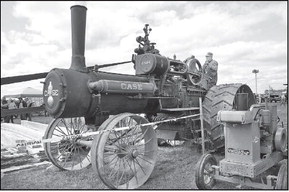A checkbook romance
President Donald Trump came to Mosinee on Thursday and asked central Wisconsin for continued support on Election Day, especially given his payments to local farmers. Whisked away by Air Force One after a two-hour speech, Trump didn’t stay for questions.
We have one. What exactly, sir, is your farm policy?
We understand that Trump flooded Wisconsin farmer mailboxes this year and last year with generous USDA checks, but sending out checks and having a farm policy are two different things. The first thing uses taxpayer dollars to buy critical rural votes in a battleground state like Wisconsin. The second thing tries to deal with agriculture’s many problems.
We wonder if Trump actually has a farm policy or if he even grasps basic agricultural realities. His speech was not reassuring. He confused methane from dairy cow flatulence that accelerates global warming with CFC’s that come from refrigerators that damage the planet’s ozone layer. He mistook tariffs paid by American retailers on Chinese imports as government revenues that he could spend on lavish farmer subsidies without impact to the U.S. Treasury. He boasted that China within the past several weeks has ordered “historic” amounts of U.S. soybeans and corn, but, even with these large orders, never acknowledged they only represent a fraction of what was supposedly agreed to in a much ballyhooed trade deal earlier this year. Commodity grain prices are no higher than when Trump was elected in 2016.
A farm policy would deal with thorny issues like the hastened loss of farms, especially in the dairy industry, combating climate change, dealing with cropland run-off and figuring out the Hispanic farm labor conundrum.
Trump never got to any of this. He couldn’t even acknowledge the basic facts of the Wisconsin ag economy. Since Trump’s election, Wisconsin has lost over 4,000 farms including 3,000 dairies. Yes, annual USDA direct payments to Wisconsin farmers just about doubled from 2016-19 to over $500 million, but, during that same time frame, Wisconsin farm-related yearly cash income, $822 million, still is less than what producers here earned in 2013, $1.2 billion. The mailbox price for milk and the September price for soybeans and corn have remained generally steady and low during four years of Trump. Wisconsin ag exports are generally the same. The state’s three biggest buyers of agricultural goods, Canada, Mexico and China, are buying slightly less Wisconsin commodities, including dairy products.
Trump ignored all of this and, instead, highlighted only his mailed checks, a political bribe, but one that, no matter who wins the presidency, cannot be sustained by a government drowning in red ink.
The tragedy of the here’s-your-check approach is that it requires farmers to do nothing for the public’s money. The Market Facilitation Program, for example, pays ag producers in Marathon County $36 for every acre they farm, $50 for every cow they have and $2.50 for every hundred pounds of milk produced without a policy goal in sight.
The basis for the payment is, if we understand the President, is not policy, but only that he loves his farmers.
This is a strange kind of love. Normally, to love anybody, you have to know them and understand their issues.
Instead, Trump engages in a checkbook relationship. The question then posed to voters in rural Wisconsin is simple. Is this the basis of a long-term relationship or a one-night romance?


